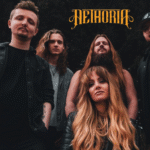Now Reading: Rich Vysion Interview – Unmasking the Self and Turning Vulnerability into Anthemic Art –
-
01
Rich Vysion Interview – Unmasking the Self and Turning Vulnerability into Anthemic Art –
Rich Vysion Interview – Unmasking the Self and Turning Vulnerability into Anthemic Art –

From the weight of silence to the liberation of unapologetic truth, Rich Vysion steps into a fearless new chapter that tears down the walls he once built around himself. In this revealing interview, the artist opens up about embracing his sexuality after years of hiding in shame, and how that act of self-acceptance reshaped every corner of his creative world. Through unflinching honesty about mental health, raw accounts of self-harm, and a commitment to telling stories without filters, he’s found new ways to connect with listeners who see themselves reflected in his vulnerability. The conversation also explores how his music, poetry, and visuals now act as lifelines for others, and why he’s determined to build safe spaces for healing and empowerment. It’s a deeply human discussion that shows how art becomes most powerful when it is rooted in lived truth.
1. Rebrands can often reflect more than just a shift in sound. What inner changes or realizations pushed you towards this reinvention, and how does it mirror where you are now, both emotionally and creatively?
This is an excellent question. I put a lot of pressure on myself to finally embrace my sexuality. For a long time, I suppressed it because I was afraid of judgment. I no longer wanted to live a double life; it felt incredibly heavy. Deep down, I knew I was a boy who liked other guys but felt immense shame about it.
It was a moment of realization that I didn’t want to live in shame anymore. Hiding for so long was exhausting, and I wanted to be free. I couldn’t live with myself if I didn’t step into my full truth. Now, I’m living openly, being flirtatious, and not caring who sees it. It feels liberating to finally relax into who I truly am.
Creatively, this shift is also evident. For instance, in my new music video, I proudly wave the LGBTQ flag, fully owning my identity and writing music that is unapologetically me.
2. Your music has long held space for conversations around mental health. How has your message deepened or shifted as you’ve moved through your own healing, and what new ground are you exploring in this chapter?
In this chapter, I’m opening up more deeply about my experiences with self-harm and suicidal thoughts, moving beyond general mental health struggles. I’m also exploring poetry and video as alternative ways to share my message, hoping others can connect in a way that resonates with them. Through it all, my mission remains to remind people they’re not alone. As I progressed through my own healing, I found the ability to speak openly about difficult topics like mental abuse. It took time to process what I was going through before I could transform those feelings into song.
3. Vulnerability and power sit side by side in your new material. How do you approach writing from deeply personal experiences without compromising your own peace?
I am extremely transparent in my music because it’s a form of healing for me—it’s cathartic. For a long time, I suppressed my anger and sadness, which ultimately didn’t serve me. Now, I’ve found an outlet that helps me process my emotions and grow in self-awareness. Being open about my experiences feels like an intrinsic part of who I am—it’s in my DNA. I believe that’s what people connect with most. Additionally, I work through more challenging issues in therapy, so I’ve never felt that sharing my thoughts compromises my peace; it actually helps me find more of it.
4. You’ve spoken about stepping more fully into your sexuality. How has that openness shaped your presence as an artist and influenced the confidence behind your work?
I never imagined I’d be waving an LGBTQ flag in a music video—that alone speaks volumes. I’m no longer seeking external approval. Stepping into this more sassy, expressive version of myself feels like unlocking a part of me that was always present but constrained by the pressure I put on myself. Being more open has helped me come to terms with the fact that my sexuality is my truth—it’s my new reality. I refuse to compromise it or diminish myself to make others comfortable. This newfound confidence is evident in my energy, in my presence—it’s simply who I am now.
5. Expression goes beyond lyrics in your world. How do you approach translating your stories into visuals and performances that resonate with both empowerment and honesty?
I try to keep it simple. I don’t believe in diluting my message with excessive fancy effects or overproduction. I tailor my performances by simply being myself and bringing a lot of energy. Sometimes I use props on stage to enhance the experience, but everything is rooted in authenticity.
When collaborating on visuals, I always request real, human elements—people who are genuinely struggling, not just polished images. I believe in expression and its power to create a truly connecting visual. I often use live footage or stock videos of real people to capture that raw, emotional feeling I’m looking for. It’s about honesty and ensuring the message feels as genuine as it is.
6. Authenticity often changes the dynamic between artist and listener. Have you felt a shift in how audiences connect with you since embracing your identity more openly?
Absolutely—especially when I first came out on social media. The support was overwhelming, which I honestly didn’t expect. I genuinely thought I’d be judged for my sexuality, but the opposite happened. Now that I’m more open, I feel people connect with me on a deeper level because many are still struggling to find themselves.
What truly surprised me is how much people are living through my music—and, in some ways, through my journey with my sexuality. A friend recently shared that my choice to step into my truth gave her son the courage to do the same. That touched me deeply. I hadn’t even realized the real impact my authenticity was having in the world. I’m incredibly grateful.
7. Self-acceptance is at the heart of your work. How has your understanding of it evolved since you first began releasing music, and how does that inform the art you’re creating today?
Another great question. When I first started out, I outsourced my sense of acceptance—I looked for it in other people. It took a lot of inner work and positive reinforcement to shift that narrative and discover what self-acceptance truly meant for me, not for anyone else.
When I came out, I had a moment of realization: this is who I am, and I get to choose to live in that truth. I am bisexual/queer, and I no longer feel the need to apologize or diminish myself. That acceptance helped me finally feel worthy within myself. I started writing more honestly about how I felt, what I valued, and how I saw myself.
As for how it has informed my art—a lot of my work is now rooted in self-acceptance. I try to keep that at the center of everything I create because I’ve seen how it can inspire others to find their own sense of worth—and that’s a beautiful thing.
8. As this new era unfolds, what do you hope listeners feel when they encounter your music for the first time, and how do you see your purpose growing in the years ahead, creatively, spiritually, and personally?
I want my audience to always feel empowered, liberated, seen, heard, and understood. That’s extremely important to me—and it’s why I only create music that speaks to those core values. Everything I create stems from that place.
Looking ahead, I see myself doing a lot of work around men’s development and youth empowerment—using creativity and self-expression as tools to help young people process what they’re going through, and hopefully, to prevent suicide. I also want to host mental health events to continue raising awareness and creating safe spaces for real conversations.
Beyond music, I see myself continuing to write books, collaborating with other LGBTQ+ artists, and building community through every form of art and advocacy I can. This is bigger than me—it’s about healing, connection, and helping others feel less alone.
Interview by Amelia Vandergast






















